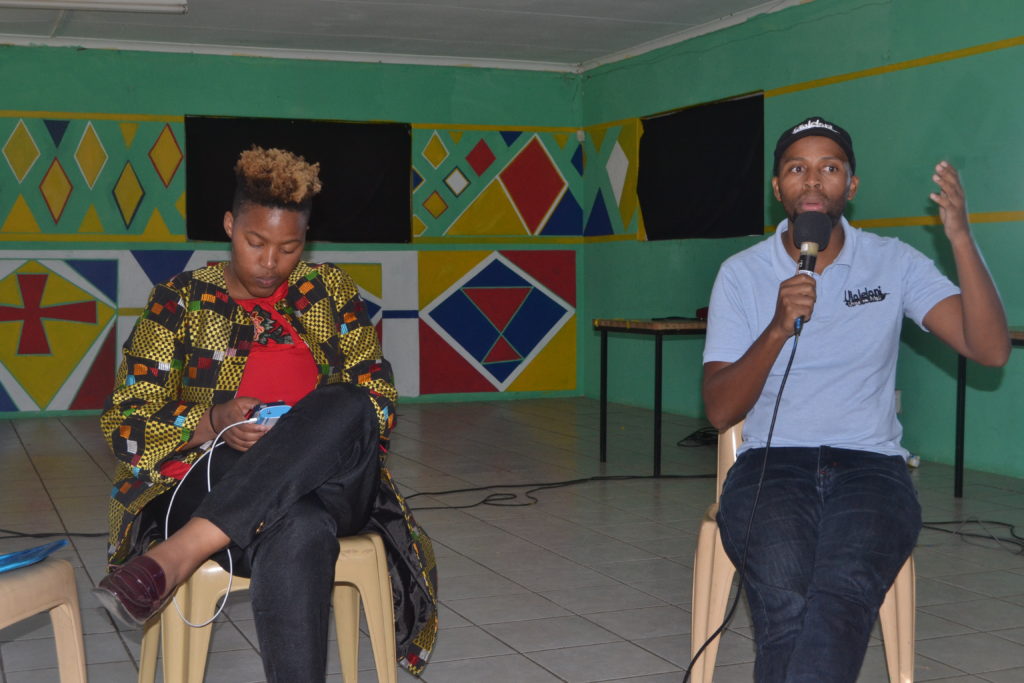This year was the 8th annual Fingo Festival, and it was organised in the unifying spirit of Tat’ Nelson Rolihlahla Mandela. The organisers of the Festival see Tat’ Mandela as a person who most represents the Eastern Cape’s contribution to African modernity. So even though they welcomed President Ramaphosa’s dedication of 2018 as the “Year of Mandela”, they are aware that Tata was not alone in the fight against colonial apartheid. Through this year’s Fingo Festival they celebrated the Eastern Cape’s contribution to African modernity via the figure of its most celebrated son and the province’s rich jazz and literature histories.

Fingo Fest ran for six days, and this year featured a new programme for Visual Artist to their list of Programmes. The ’10 Canvases – 10 Artists’ programme was pioneered by Andiswa Bliss Rabeshu and Mkhonto Gwazela, the aim was to transform the streets of Fingo into an Art Gallery.
The annual kids’ programme, “Izodlala Nathi” always starts things off early in the morning. Here the children of Grahamstown’s townships are treated to a small, healthy breakfast and fun-filled activities geared towards keeping the parts of their brain responsible for learning active during their winter school holidays. The hope is always that the energy generated from the activities of the young ones spreads to the rest of the daily programmes. This year they invited one of their biggest supporters and family members, Mkhonto Gwazela from Port Elizabeth to do some sketching workshops with the kids.
2018 saw South Africa losing a couple of cultural icons, namely Bra Hugh Masekela and Bra Willy Kgositsile. While these two were famous for their careers that they built overseas, the fact remains that their work started here at home. The aim of this discussion, which was led by Kabelo Mofokeng, a doctoral candidate in Musicology at Rhodes University, whose research is on the untold stories of jazz in the Eastern Cape. Bra Kabz, as he is affectionately known, shared some of these stories that he has uncovered in places like Komani and our very own Rhini.
The Live Performances programme created a space for local artists to share the stage with some national and international artists in town for the Festival. It seen as exposure for the local artists, as the one with the best audience reception at the end of the day, with images posted on Fingo Fest social media platforms.
Performance artist Sikhumbuzo Makandula presented a screening and discussion of his work that he did in Rhini in 2016. The work was on the untold history of the Grahamstown Cathedral.
Singer-songwriter Msaki hosted an artist development workshop for emerging local artists in the townships. She shared her experience as a musical artist who has over the past couple of years been nominated for the SAMA awards and ghost-written for many electronic musicians. The aim was for local artists to gain from her experience and watch out for the sharks in the sea of artistry.

Taking the baton from where Msaki left off, veteran music industry manager and consultant
Sakhele Mzalazala presented his music rights booklet Music Rights Vol. 1. The booklet is a
musicians’ guide to understanding how intellectual property and royalties work in South Africa
and internationally. This issue is a very pressing issue for black artists, who historically have
been robbed of royalties from their artistic creations. The hope was to get our local artists to be
more aware of their rights as creators and exercise them when the need occurs.
This year’s Women’s dialogue was be in honour of Mam’ Albertina Sisulu, who would have been 100 years old this year, and Mam’ Winnie Madikizela-Mandela, who passed on early this year. This dialogue was informed by Dr Babalwa Magoqwana’s thinking around the role of umakhulu in our communities, which is very vital as we are seeing more than 50% of black households being run by grandmothers. As usual, this dialogue was for women only, and they are happy to keep it like that so that it is a space where women can gather to talk about their integral roles in our society.
Coming straight from Despatch in Port Elizabeth, creative writer and essayist Unathi Slasha presented his newly-released novella Jah Hills in the form of a reading and discussion of some of the issues he raises in the book. Slasha’s work is an attempt to subvert Nguni folklore and to make spaces like entabeni, where Jah Hills is mostly set, more generative than they are presented in colonial modern discourse.



